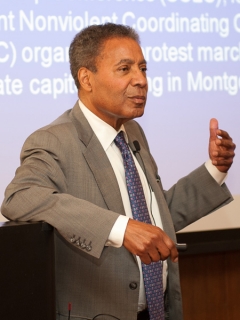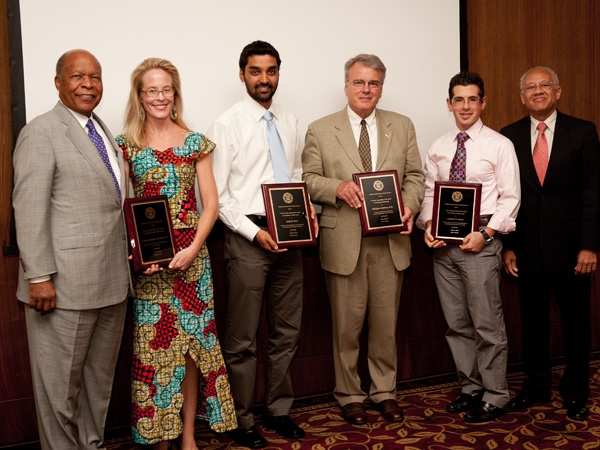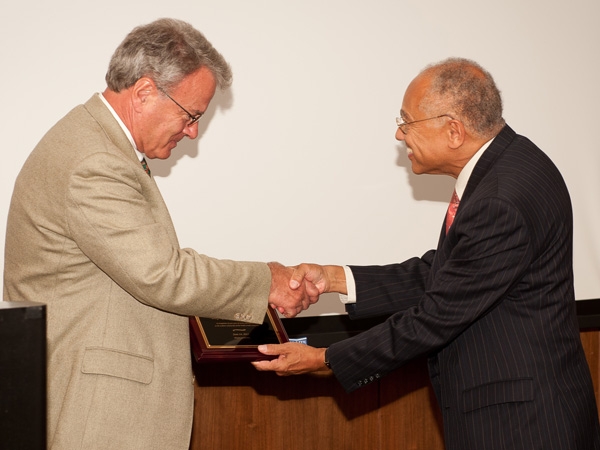A select group of students, trainees and faculty at Weill Cornell Medical College were honored with "Pioneers in Diversity" awards from the Medical College's Office of Faculty Diversity in Medicine and Science at an event held June 14 in Griffis Faculty Club.

Dr. Alvin Poussaint, '60, delivered the keynote address at Weill Cornell's first "Pioneers in Diversity" awards, June 14.
The keynote lecture at the ceremony was given by Dr. Alvin Poussaint, '60, who is currently professor of psychiatry and faculty associate dean for student affairs at Harvard Medical School.
Working with the Diversity Council, the Medical College's Office of Faculty Diversity developed three awards that recognize work "promoting diversity at Weill Cornell as well as in providing care for the diverse population that we serve," said Dr. Carla Boutin-Foster, director of the Office's diversity in medicine and science and an associate professor of medicine, public health, and complementary and integrative medicine at Weill Cornell.
Tri-Institutional MD-PhD students Jonathan Moreno and Suchit Patel won the Ida S. Scudder Award for Service, named in honor of one of the first female graduates of the Medical College. Moreno and Patel were recognized for their work as past executive directors of the Weill Cornell Community Clinic, which they collectively transformed from "a small student group with an unsure sustainability plan into a robust and sustainable organization that has become central to the framework of the service learning curriculum at Weill Cornell," Dr. Boutin-Foster said.
Dr. Katrina Blackburn Mitchell, a second-year general surgery resident, received the Louis Wade Sullivan Award for Advocacy, given to a resident or postdoctoral fellow who has been "an outspoken champion for health promotion and a public health advocate, especially for medically underserved populations." Dr. Blackburn Mitchell was recognized for her work helping develop a general surgery curriculum for the Weill Bugando Medical Center in Tanzania as well as her work as director of Operation Giving Back, a program at the American College of Surgeons that provides surgical residents with opportunities to volunteer nationally and internationally. Her award is named after former secretary of the U.S. Department of Health and Human Services Dr. Louis Wade Sullivan, who completed his internship and residency at the New York Hospital–Cornell Medical Center from 1958 to 1960.
Dr. Olaf Andersen, director of the Tri-Institutional MD-PhD Program at Weill Cornell, received the Bruce Laine Ballard Award for Mentorship, named in honor of Dr. Bruce Ballard, former associate dean for Student Affairs and Equal Opportunity Programs at Weill Cornell. Under Dr. Andersen's leadership over the last 15 years, one-third of the MD-PhD program at Weill Cornell is now comprised of minority students, double the national average and making it number one in diversity in the country. Dr. Andersen received more than 64 pages of letters from students and faculty supporting his nomination for the award.
Dr. Poussaint spoke about the effect of race on his medical career, from his early experiences as the only black student in his medical class at what was then Cornell University Medical College, to his work as a volunteer physician during the civil rights movement in the mid-1960s in Mississippi and Alabama, where he marched alongside Martin Luther King Jr. and Robert Parris Moses.

Former secretary of the U.S. Department of Health and Human Services Dr. Louis Wade Sullivan (far left) and former associate dean for Student Affairs and Equal Opportunity Programs at Weill Cornell Dr. Bruce Ballard (far right) joined winners of the 2011 "Pioneers in Diversity" award (from left) Dr. Katrina Blackburn Mitchell, Suchit Patel, Dr. Olaf Andersen and Jonathan Moreno.
When Bob Moses asked Dr. Poussaint to come to the South to work full time on issues of discrimination in medicine and health care, Dr. Poussaint said he did so because he believed that "the mental health problems [of minorities] were caused by discrimination, and you couldn't change patients one-by-one; you had to change the system."
When he went South, Dr. Poussaint found all of the hospitals in Mississippi were segregated, and black physicians were not allowed into the American Medical Association, which effectively barred them from gaining admitting privileges to the hospitals in the South. Many of the discriminatory actions by the American Medical Association and American Association of Medical Colleges have only been acknowledged — and apologized for — within the past five years, Dr. Poussaint said.
"We have accomplished much, but there is still much to do," Dr. Poussaint said. For example, over the past seven years, the percentage of black applicants to U.S. medical schools has dropped, which Dr. Poussaint attributes to fewer black male applicants.
"We need to continue to push and stay active, particularly to keep from falling backwards," Dr. Pouissant said. "Go out and keeping fighting. Things don't happen unless you make noise."

